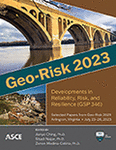Small- and Medium-Scale Assessment of Rockfall Coefficients of Restitution
Publication: Geo-Risk 2023
ABSTRACT
Smart Rock (SR) sensors designed at the University of New Hampshire have been used to instrument laboratory and field rockfall experiments. This paper summarizes the results of instrumented small- and medium-scale tests using SRs embedded in the test blocks, performed with the aim to enhance input parameters in rockfall models and to evaluate the contribution of block rotation, often disregarded in energy computations. Fabricated concrete blocks weighing 1 and 13.5 kg were released under controlled conditions onto a poorly graded sand from a height of 1 to 10 m. The impacted surface was also varied at angles between 0° and 42°. High-speed video and SR data were used to determine block translational and rotational velocities of 45 tests and to calculate their energy restitution after each drop. The results demonstrate that different test conditions produce distinct responses in terms of energy restitution, highlighting the difficulty of using fixed coefficients of restitution to realistically model rockfall trajectories.
Get full access to this article
View all available purchase options and get full access to this chapter.
REFERENCES
Apostolov, A. (2016). Development and testing of motion tracking “Smart Rock” devices for geotechnical applications. (Master’s thesis). University of New Hampshire, Durham, NH.
Apostolov, A., and Benoît, J. (2017). Motion Tracking “Smart Rock” Device for the Study of Landslide and Debris Flow Mechanisms. North American Symposium on Landslides. Roanoke, VA, June 4-8.
Asteriou, P., Saroglou, H., and Tsiambaos, G. (2012). “Geotechnical and kinematic parameters affecting the coefficients of restitution for rock fall analysis.” International Journal of Rock Mechanics and Mining Sciences, 54, 103–113.
Disenhof, C. R. (2018). Investigation of Surface Models and the Use of a Smart Rock for Rockfall Modeling. (Master’s thesis). University of New Hampshire, Durham, NH.
UGE (Université Gustave Eiffel). (n.d.). La station de chute de blocs de Montagnole [Rockfall testing station in Montagnole]. Retrieved September 8, 2022, from https://rro.univ-gustave-eiffel.fr/ressources-et-equipements/la-station-de-chute-de-blocs-de-montagnole.
Gullison, M. (2013). Analysis of Smart Rock data from debris flow experimentation. (Master’s thesis). University of New Hampshire, Durham, NH.
Harding, M. (2011). Design and development of a debris flow tracking “Smart Rock”. (Master’s thesis). University of New Hampshire, Durham, NH.
Harding, M. J., Fussell, B. K., Gullison, M. A., Benoît, J., and de Alba, P. A. (2014). “Design and testing of a debris flow’ smart rock'.” Geotechnical Testing Journal, 37(5), 769–785.
Heidenreich, B. (2004). Small- and Half- Scale Experimental Studies of Rockfall Impacts on Sandy Slopes. (Doctoral thesis). École Polytechnique Fédérale de Lausanne, Lausanne, Switzerland.
Hoek, E. (1987). Rockfall: a computer program for prediction rockfall trajectories. Vancouver, Canada.
Turner, A. K., and Duffy, J. D. (2012). Evaluation of Rockfall Mechanics. In Turner, A.K. and Schuster, R.L. (Eds). Rockfall Characterization and Control (pp. 285–333). Washington, D.C.: Transportation Research Board.
Ritchie, A. (1963). Evaluation of Rockfall and its Control. Highway Research Board, N.17, 13–28.
Souza, B. M. M. (2021). Use of Smart Rocks to Improve Rock Slope Design. (Master’s thesis). University of New Hampshire, Durham, NH.
Souza, B., Miller, H., Benoît, J., and MacAdam, N. (2022). Evaluation of coefficients of restitution for rockfall modeling. 20th International Conference on Soil Mechanics and Geotechnical Engineering. Sydney, Australia, May 1-5.
Souza, B., Benoît, J., Bost, M., and Reiffsteck, P. (2022). Évaluation à petite echelle des coefficients de restitution des chutes de blocs [Small-scale assessment of rockfall coefficients of restitution]. Journées Aléas Gravitaires, Montpellier, France, May 10-12.
Souza, B., and Benoît, J. (2022). Use of Smart Rocks to Improve Rock Slope Design. 71st Highway Geology Symposium, Asheville, North Carolina, May 23-25.
Wyllie, D. C. (2015). Rock Fall Engineering. New York, NY: CRC Press, Taylor & Francis Group.
Information & Authors
Information
Published In
History
Published online: Jul 20, 2023
ASCE Technical Topics:
- Colleges and universities
- Computer models
- Concrete
- Concrete blocks
- Continuum mechanics
- Dynamics (solid mechanics)
- Education
- Engineering fundamentals
- Engineering materials (by type)
- Engineering mechanics
- Equipment and machinery
- Geohazards
- Geology
- Geotechnical engineering
- Landslides
- Materials engineering
- Mathematics
- Models (by type)
- Motion (dynamics)
- Parameters (statistics)
- Practice and Profession
- Probe instruments
- Rocks
- Rotation
- Solid mechanics
- Statistics
Authors
Metrics & Citations
Metrics
Citations
Download citation
If you have the appropriate software installed, you can download article citation data to the citation manager of your choice. Simply select your manager software from the list below and click Download.
